- Home
- Vera Nazarian
Northanger Abbey and Angels and Dragons Page 12
Northanger Abbey and Angels and Dragons Read online
Page 12
Here, the demands of the dance overtook their conversation.
Soon after their reaching the bottom of the set, Catherine perceived herself to be earnestly regarded by a gentleman who stood among the lookers-on, immediately behind her partner.
The angels flew up in a turbulent cloud, as though to signal by their very maneuverings his importance.
He was a very handsome man, of a commanding aspect, great and regal in a manner difficult to describe. He was past the bloom, but not past the vigour of life. And with his dragon eye still directed towards her, she saw him address Mr. Tilney in a familiar whisper.
Confused by his notice, and blushing from the fear of something being wrong with her appearance, she turned away. But the gentleman retreated, and her partner, returning, said, “That gentleman knows your name, and you have a right to know his. It is General Tilney, my father.”
Catherine’s answer was only “Oh!”—but it was an “Oh!” expressing every attention to his words, and perfect reliance on their truth. With interest and admiration did she now observe the general, as he moved through the crowd, thinking, “How handsome a family they are!”
In chatting with Miss Tilney before the evening concluded, a new source of felicity arose. Catherine had never taken a country walk since her arrival in Bath. Miss Tilney, familiar with all the commonly frequented environs, spoke of them in terms that made Catherine only too eager. It was then proposed by the brother and sister that they should join in a morning walk.
“I shall like it,” she cried, “beyond anything in the world; and let us not put it off—let us go tomorrow.”
This was readily agreed to, providing it did not rain, which Catherine was sure it would not. At twelve o’clock, they were to call for her in Pulteney Street; and “Remember—twelve o’clock,” was her parting speech to her new friend.
Her other, more established, and more arctic friend, Isabella, whose fidelity she had enjoyed a fortnight, Catherine scarcely saw at all during the evening. Instead, she cheerfully submitted to the wish of Mr. Allen to leave well before midnight and the demon hour, which took them rather early away.
Catherine’s spirits danced within her, the angels danced above, and she danced in her chair all the way home.
Chapter 11
The morrow brought a very sober-looking morning, the sun making only a few efforts to appear—yet, to Catherine, a most favourable portent. A bright morning so early in the year would turn to rain, but a cloudy one foretold improvement as the day advanced.
Catherine applied to Mr. Allen for confirmation of her hopes of sunshine, then to Mrs. Allen, whose opinion was a veritable echo of one’s hopes.
At about eleven o’clock, however, there were a few specks of small rain upon the windows. “Oh! dear, I do believe it will be wet,” said Catherine in a most desponding tone.
Mrs. Allen could only echo her.
Two dear angels, possibly Lawrence or maybe Terence, or Clarence—oh, for heaven’s sake, Catherine had no idea—settled on the nearest windowsill and attempted to console her with their dulcet voices. “A rainy day is a lovely time for thought and for reading, dear child—though maybe not necessarily those frightful books—Why not instead peruse the writings of a certain Miss Austen?”
Catherine sighed, ignoring heavenly wisdom. “No walk for me today,” she said wistfully. “But perhaps it may come to nothing, or it may hold up before twelve.”
“Perhaps it may, but then, my dear, it will be so dirty.” Mrs. Allen mused in genteel despair, foreseeing soggy muslin, ruined gowns and shoes.
“Oh! That will not signify; I never mind dirt.”
“No,” replied her friend very placidly, “I know you never mind dirt.”
After a short pause, it became apparent that the rain only increased. Catherine stood watching it at a window.
“Oh! There are four umbrellas up already. How I hate the sight of an umbrella! It was such a nice-looking morning!”
“There will be very few people in the pump-room, if it rains all the morning,” said Mrs. Allen. “I hope Mr. Allen will put on his greatcoat when he goes. A gentleman had informed him that a greatcoat might indeed be the key to some secret clue—Oh dear, no; maybe he was talking about a great boat? Or was it a castle moat?”
“Goodness, what is it?” said Catherine, for the words “secret” and “clue” and “castle” drew her immediate attention.
But Mrs. Allen has absolutely forgotten what it is she was saying.
Meanwhile the rain continued—fast, though not heavy. Catherine went every five minutes to the clock. Eventually the clock struck twelve, and it still rained.
“You will not be able to go, my dear.”
“I do not quite despair yet. I shall not give it up till a quarter after twelve. This is just the time of day for it to clear up, and I do think it looks a little lighter. There, it is twenty minutes after twelve, and now I shall give it up entirely. Oh! That we had such weather here as they had at Udolpho, or at least in Tuscany and the south of France!—the night that poor St. Aubin died!—such beautiful weather!”
And resigned to a gloomy day and no walk, Catherine sat down with Udolpho and attempted to read. But instead of losing herself in the gothic terrors, the titles of the other seven horrid novels tumbled in her mind.
“Upon my word!” Catherine decided. “If there is to be no walk, and no Udolpho, then at least I might use this tedious time to think upon the secret clues and the mysteries of the treasure!”
And so Catherine recited the novels in her mind . . .
Castle of Wolfenbach . . . Clermont . . . Mysterious Warnings . . . Necromancer of the Black Forest . . . Midnight Bell . . . Orphan of the Rhine . . . Horrid Mysteries . . .
Oh, criminy! What dark occult impossibilities were hidden in this Udolpho Code?
Maybe it had something to do with the first letters of each title? As in, a clever cryptic, formed as the result of considering only the capitals?
“Perhaps,” mused Catherine, “if one is to take the capital letters of ‘Castle of Wolfenbach’, it spells the word ‘cow.’ Hence, could it be a Clue, and is a bovine involved? Possibly even an entire herd of them?”
But then it occurred to her, maybe the titles themselves presented the secrets in the very images they formed, such as “Necromancer of the Black Forest”—who was surely none other than a wicked magician hiding away in a dark wooden glade, possibly masked and wearing a long black greatcoat . . . Possibly even ogre-shaped, and belching odious heat, not unlike a certain gentleman she knew . . .
Oh dear! Could it be—Was John Thorpe himself a Clue?
At half past twelve—when Catherine’s anxious attention to the weather had been replaced with anxious muddled thoughts and feverish decrypting of horrid secrets—the sky began voluntarily to clear.
A gleam of sunshine took her quite by surprise. She looked round; the clouds were parting, and she instantly returned to the window. Ten minutes more made it certain that a bright afternoon would succeed. But whether Catherine might still expect her friends, or whether there had been too much rain for Miss Tilney to venture, was still a question.
It was too dirty for Mrs. Allen to accompany her husband to the pump-room. He accordingly set off by himself. Catherine had barely watched him down the street when she noticed the approach of the same two open carriages, containing the same three people that had surprised her a few mornings back.
“Isabella, my brother, and Mr. Thorpe, I declare!” exclaimed Catherine, unsuitably reminded of a certain encounter with a horrid flying duck. At present, thankfully, two angels fluttered overhead. “They are coming for me perhaps—but I shall not go—I cannot, indeed! For, Miss Tilney may still call.”
Mrs. Allen echoed placid agreement.
But then the weather in the room changed to the Tropics, then the African Continent, all in a span of a few breaths. John Thorpe was soon with them—and his voice was with them yet sooner, for on the stairs he was bellowing out t
o Miss Morland to be quick.
“Make haste! Make haste!” He threw open the door. “Put on your hat this moment—there is no time to be lost—we are going to Bristol. How d’ye do, Mrs. Allen?”
“To Bristol! Is not that a great way off? Regardless, I cannot go with you today, because I am engaged; I expect some friends every moment.” Catherine spoke bravely.
This was of course vehemently talked down as no reason at all. Mrs. Allen was called on to second him, and under the onslaught of such heat—both tangible and metaphoric—she wilted—both literally and figuratively.
The two others walked in, to give their assistance—and to return to this spot of nature a proper temperate climate.
“My sweetest Catherine, is not this delightful? We shall have a most heavenly drive!” screeched and cooed Isabella. “You are to thank your brother and me for the scheme, conceived at breakfast-time. We should have been off two hours ago if it had not been for this detestable rain. But it does not signify! Oh! I am in such ecstasies at the thoughts of a little country air and quiet! So much better than going to the Lower Rooms. We shall drive directly to Clifton and dine there; and then, on to Kingsweston.”
“I doubt our being able to do so much,” said Morland.
“You croaking fellow!” roared Thorpe. “We shall be able to do ten times more. Kingsweston! Aye, and Blaize Castle too, and anything else we can hear of, maybe even London itself and back! But here is your sister, says she will not go.”
“Blaize Castle!” cried Catherine. “What is that?”
“The finest place in England—worth going fifty miles at any time to see.”
“What, is it really a castle, an old castle?”
“The oldest in the kingdom. Maybe the entire Europe. Oh, all right, the civilized world, blast it!”
“But is it like what one reads of?”
“Exactly—the very same. Mrs. Radcliffe must have copied it word for word. Aye, letter to letter.”
“But now really—are there towers and long galleries?”
“By dozens. Or twice that. All in all, a reeking bucket of secret Clues, ready to be popped.”
“Then I should like to see it; but Oh! I cannot—I cannot go.
“Not go! My beloved creature, what do you mean?” interrupted Isabella in a delicate screech, training her sickly yellow eyes and an icy breath upon her dearest friend.
“I cannot go, because—” Catherine looked down, fearful of Isabella’s treacle smile—“I expect Miss Tilney and her brother to call on me to take a country walk. They promised to come at twelve, only it rained. Now, I imagine they will be here soon.”
“Not they indeed,” growled Thorpe; “for, as we turned into Broad Street, I saw them—does he not drive a phaeton with bright chestnuts?”
“I do not know indeed.”
“Yes, I know he does; I saw him. You are talking of the man you danced with last night, are not you?”
“Yes.”
The angels around Catherine signaled warning, but she knew not at what.
“Well, I saw him at that moment turn up the Lansdown Road, driving a smart-looking girl.”
“It is very odd! But I suppose they thought it would be too dirty for a walk.”
“And well they might, for I never saw so much dirt in my life. Walk! You could no more walk than you could fly! It is ankle-deep everywhere. And some places, up to the waist.”
Isabella corroborated it: “My dearest Catherine, you cannot form an idea of the dirt; come, you cannot refuse going now.”
Catherine was truly torn . . .
“I should like to see the castle; but may we go all over it? May we go up every staircase, and into every suite of rooms?”
“Yes, yes, every hole and corner, and dig around aplenty.”
“But what if they are only out for an hour, and then call?”
“Nay, there is no danger of that—I heard Tilney hallooing to a passerby, that they were going as far as Wick Rocks.”
“Then—I suppose I will. Shall I go, Mrs. Allen?”
“Just as you please, my dear,” was Mrs. Allen’s echo reply.
And in two minutes they were off.
Catherine’s feelings, as she got into the carriage, were in a very unsettled state; divided between hope and regret.
She could not think the Tilneys had acted quite well by her, in so readily giving up their engagement, without notice. It was now but an hour later, and—in spite of what she had heard of the prodigious accumulation of amazing dirt in the course of that entirely miraculous meteorological hour—she could not help observing they might have gone walking with very little inconvenience.
To feel herself slighted by them was very painful.
On the other hand, the delight of exploring an edifice like Udolpho—as her fancy represented Blaize Castle to be—was sufficient compensation for almost anything.
And thus, Catherine could not help but muse out loud, continuing the exciting mental calisthenics of earlier that morning, when gloom and rain had revealed in her a considerable sleuthing talent.
“I was pondering earlier upon the mysteries of Mrs. Radcliffe and other horrid novel authors, and what might constitute the Udolpho Code,” she said. And she immediately received the full attention of the Thorpes and her brother.
“It seems to me,” she continued, “that, as one possible solution, the various novels are to be considered as puzzles, by taking the first capital letter of each word in the title, and then arranging them, or perhaps rearranging them as needed to form other words! And the words themselves are grand Clues as to the secret location of the hidden treasure.”
“Oh, is that so? Hum!” said Thorpe, thinking with such concentration that he almost released the reins of the horse. “How would that be then, exactly?”
“Well,” said Catherine. “It came to me that if one were to take the first letters of ‘Castle of Wolfenbach’, it spells ‘cow.’”
“Cow! By Jove, what brilliant thinking, Miss Morland! ’Tis so! A cow, indeed!”
“But what does it mean?” hissed Isabella, serpentine-sweet.
“Well, I venture it could be a cow one might look for to obtain a meaningful clue. Maybe a field of cows, grazing gently, and one might see a splendid landmark; or one might be required to dig in a spot where a cow—”
“—Where a cow made its dump!” finished Thorpe with a roar. “Exactly so! My deduction exactly! Aye, what a fine mind you have indeed, much like mine, I dare say!”
“Oh dear . . .” Clarence sighed into Catherine’s right ear.
Catherine began to cough.
“But it is not all,” she said, recovering. “There is another possible method of decrypting the code—the novel titles themselves could be descriptive clues to things, for example, ‘Midnight Bell’ may indicate an actual mysterious bell somewhere in Bath that either rings at a certain very particular time or is located near the treasure, or is a clue leading to it—”
“That’s it! The bell tower! Blazes, yes! It could be the place to go look, first!” Thorpe was at this point roaring so loudly that on the sidewalk passerby turned to look in their direction.
“Now, some of these are more obscure than others,” said Catherine. “Indeed, I am not entirely certain of ‘Clermont’—”
“Clermont? Nonsense, I am certain as all Hades!” interrupted Thorpe. “It is none other than Mrs. Clermont and her daughters! You know the family, Isabella, father’s an older daft fellow; daughters are passable—”
“There is—uhm—‘Necromancer of the Black Forest’—” James dared to join the decryption discourse for the first time.
“N-O-T-B-F,” muttered Isabella in a modulating voice, pronouncing each capital letter in a higher tone.
“N-O-T-B-F!” repeated Thorpe, bellowing in return. “That one is easy! The easiest ever! NOT BF! Who is BF? That’s ‘Not Beatrice Foster!’ Lady Beatrice Foster it is!”
“But it is ‘not’,” said Catherine.
; “Well of course it is not, that is—it is, I mean, blazes!”
“But if it is not Lady Foster, then why mention her in a Clue in the first place?”
“Aha, but I have it all here, Miss Morland!—the Clue clearly states that it is not Beatrice Foster because it simply has to be in fact her brother, the baronet! The Clue points at him, verily screams! I am willing to bet fifty pounds on it!”
“Well, I dare say it is possible.”
“Not just possible, but very likely, and a firm guarantee! As plain as day! Absolutely sterling to the pound!”
“Then how would you solve ‘Orphan of the Rhine’?”
“Same exact way! Not some poor beady-eyed waif, I say, but O-O-T-R—”
“Wait, I have it! You must move the letters around for this one,” Catherine interrupted him in turn. “Surely it must then be ‘R-O-O-T’?”
“Yes! A root vegetable! Verily a potato, Miss Morland!”
“And why not a carrot or a turnip?” considered Isabella.
“Who says not?” Thorpe roared. “It is clearly all root vegetables! Every one of them, roots! Potatoes, turnips, carrots, rutabagas, horseradishes! What else is there, help me out, Bella, Morland, Miss Morland!”
At that point the conversation deteriorated even further into monosyllabic spellings out of various combinations of arcane first letters, with Thorpe yelling out new possible Clues every few seconds and waving his whip about with one hand, while narrowly missing the horse and his own sister at least upon two occasions.
They passed briskly down Pulteney Street, and through Laura Place, without ceasing this exchange. Thorpe talked to his fair companion, his sister, her partner, even his horse. And Catherine eventually ceased listening and meditated, by turns, on broken promises and broken arches, phaetons and false hangings, Tilneys and trap-doors. Clues of her own—marvelous, arcane, perfectly sensible yet utterly romantic—danced in her imagination to shape her own private version of the true Udolpho Code. . . .

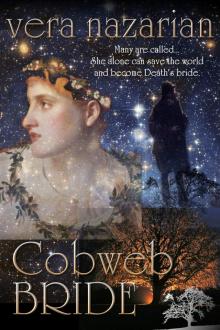 Cobweb Bride
Cobweb Bride Survive
Survive![[Atlantis Grail 01.0] Qualify Read online](http://i1.bookreadfree.com/11/atlantis_grail_01_0_qualify_preview.jpg) [Atlantis Grail 01.0] Qualify
[Atlantis Grail 01.0] Qualify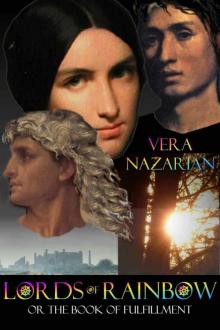 Lords of Rainbow
Lords of Rainbow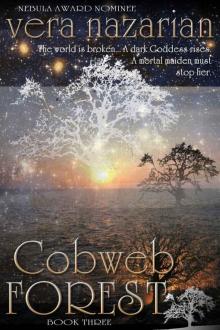 Cobweb Forest (Cobweb Bride Trilogy)
Cobweb Forest (Cobweb Bride Trilogy) Compete
Compete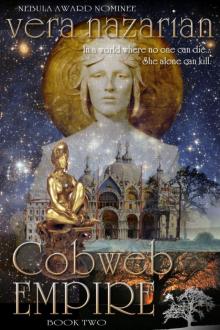 Cobweb Empire
Cobweb Empire Northanger Abbey and Angels and Dragons
Northanger Abbey and Angels and Dragons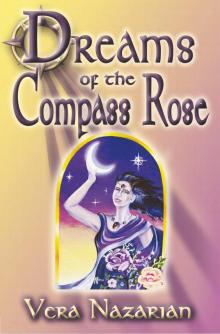 Dreams of the Compass Rose
Dreams of the Compass Rose Win
Win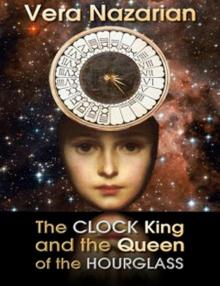 The Clock King and the Queen of the Hourglass
The Clock King and the Queen of the Hourglass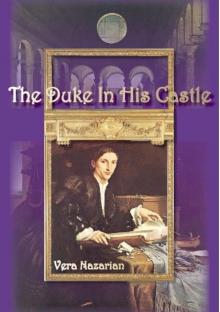 The Duke In His Castle
The Duke In His Castle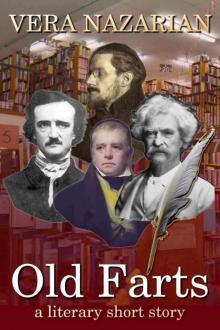 Old Farts
Old Farts